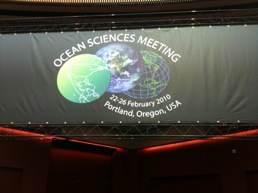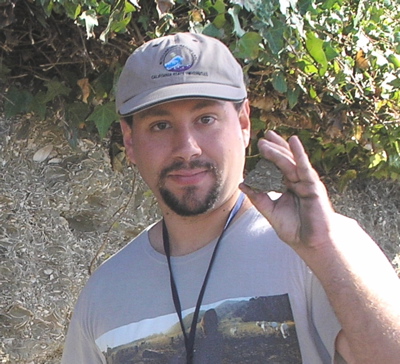

by Jeremiah Brower, Geological Oceanography Lab
Well it’s been a while since my last post, but things have been busy! With my last sample season far behind me, my thesis writing is well underway. Many students at Moss Landing try to travel to conferences across the world to present the results of their research BEFORE they have to make a final defense, and I am no exception. As our decade came to a close, I tried to open as many future doors as possible by making a poster and attending the international Ocean Sciences (OS) Meeting in Portland.
The annual OS meeting brings together some of the top minds in oceanography to present the latest advances in all aspects of Marine Science and I felt privileged to be able to join them. I spent the January preparing and going through many many different drafts of my poster. Initially I’m always happy to work on a poster, it gives my poorly neglected artistic side a chance to mingle with the rest of my brain to create something both visually appealing and scientifically accurate. After a month of working on the thing my feelings changed and I began to hate spending hours on simple formating while my aging computer struggled under the weight of the behemoth Keynote file. In the end, the poster was printed, I got time off of work and everything was ready for the week-long conference.

Unfortunately I developed a nasty flu just as I was leaving Moss Landing so I spent most of the conference groggy and drugged-up, but despite my poor health the event was a resounding success. I presented my poster and received some great feed-back from some of the key scientists whose past research served as inspiration for my thesis. There were some phenomenal presentations that represented a good variety of both field research and statistical modeling. Personally, I thought that results of field research are more compelling then ocean modeling, but there is value in both approaches.
I had to leave the conference early because my flu was becoming worse, but after I returned to the Monterey Bay I was able to recover and begin work on finishing my thesis! I used the feedback I received from Portland to re-structure some sections of my presentation and start thinking about what my data actually meant! As much of a pain as the poster ended up being, it forced me to start thinking about the conclusions of my thesis. The poster, while general in its representation of my research, provided the platform I needed to dive into writing my thesis draft. I was able to use the conference to organize my thoughts and present them to my peers both in and outside of the lab environment. Finally, the conference allowed me to assess how far I still had to go and plan the rest of the year.
A few weeks after Portland, I presented my conclusions at a lab meeting and with the help of my advisor and the blessings of my committee, I was able to set a date for my thesis defense in late May! There is a lot of work that still needs to be done, but I should have no trouble getting ready to present my final conclusions at the end of the Spring semester. I’m taking the last stage very slow: spending my weekends reviewing data and writing up my final conclusions, making sure everything fits into a nice little story. My advisor has stressed the “story” structure of my presentation because there are not many physical science defenses at Moss Landing, so my audience will be largely uninformed about the background to my research. My thesis has nothing to do with gut-content analysis of Harbor Seals or age and growth modeling of Skates (two of the more common Moss Landing thesis topics), so the challenge for me will lie in explaining to a room full of biologists why they should be interested in sand!

To wrap things up, I can’t recommend scientific conferences enough! They force you to make some sort of order out of the chaos of your data and it exposes your research to the larger scientific community across the world. The rest of the year after my defense is a unknown factor. I don’t have any guaranteed jobs, nor am I moving directly into a Ph.D program (maybe in the future, but not now), but I can take a little comfort in the fact that I’m doing all that I can to expose my research and make those vital connections that will lead to future employment. For now, I just cross my fingers that my life retains some sort of stability that will let me finish my thesis. After that….I suppose the sky’s the limit.
Rock on!

